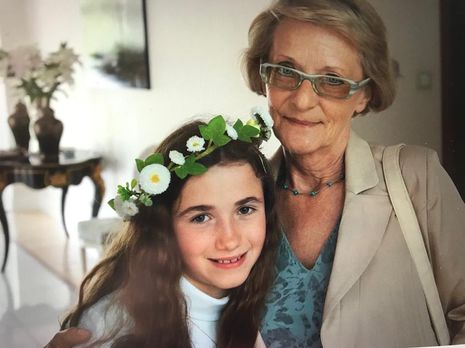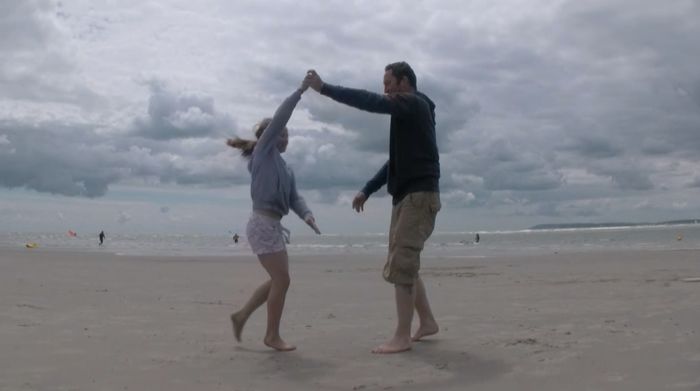On long distance loss
Deputy Editor Inès Magré recounts the life and loss of a woman who loved and raised her, considering how the process of grieving goes beyond borders

“Climb up!” Pani Ela would say, hurling me up onto the ironing table by the window and letting me be on the lookout for my mum’s car as she’d come back from work.
Anyone who asks me about my preschool years is met with a long sigh and: “Oh my God. What I would do to go back and freeze time”. Walks in the park, drinking from juice cartons, feeding ducks, sitting on the lid of the blue metallic bin and listening to polish folk stories, walking back from school hand in hand singing songs about summer; it was magical. There is one common denominator in all these scenes. Pani Ela. My childhood nanny — but really, my third grandma.
“Pani Ela was the elderly presence surrounding me every day of the year when my biological grandmothers were over 1500 miles away”
With my parents’ hectic work hours, it would be easy to assume I was raised purely by nannies. Yet this was far from the truth. My parents were always there when we needed them and made sure to make time for their children. Rather than feeling like I’d been passed on to a nanny, I actually remember feeling lucky from an early age that I got to spend special time alone with Pani Ela when my parents were at work, from the very early age of three years old.
The word Pani means Ms in Polish. Even though Pani Ela raised me like her own granddaughter, the mark of respect was never dropped; but don’t mistake it for distance or coldness, Pani Ela was the elderly presence surrounding me every day of the year when my biological grandmothers (whom I loved so very much) were over 1500 miles away. Pani Ela has always had the typical character of a Polish person who lived through communism which I admire so much — tough, cynical, cold on the outside but an absolute sweetheart on the inside. Veneers children and carries a slight air of superiority to anyone outside their immediate circle. She was always impeccably dressed, styled, and never a minute late. As my teenage self would say, she had her shit together.
In January of 2020, when I was home for the Christmas holidays, Pani Ela started coughing. The kind of cough that, at the time of the word 'coronavirus' creeping its way into news headlines, we might’ve mistaken for early symptoms of Covid. But three months later, Pani Ela was diagnosed with lung cancer. ‘Half of women will get cancer at some point in their lives', was a statistic that reassured me. Half of women globally don’t die of cancer, I told myself, she was going to be alright.
“All I can do is pick up the phone but even that feels like a gargantuan task”
So you can imagine my shock as I walked into her house over the winter vacation, to visit her with some homemade brownies, only to find her bedridden, struggling to talk, having lost her hair and on the verge of tears. That’s the thing about cancer: one week you’re on the phone and treatment is working, you’re making plans to trace back the steps of your childhood by taking a walk to your old preschool and the next you’re being asked when you will next be home, a quick calculation going on in the patient’s mind concluding “I should be able to hang on till then.”
The last time I felt this helpless was being separated by closed borders during lockdowns from my 95-year-old grandma living alone. Strangely though, when she passed, I was overcome with a deep sense of calmness that she had lived an incredible and long life and that it was time to rest. This time around I am faced with anxiety, anger and upset. All I can do is pick up the phone but even that feels like a gargantuan task when faced with impending death in every sentence. So here I am, a two-hour flight away, feeling like I’m mourning before we’ve even buried another one of my grandmas in the space of eighteen months. I feel I have lost this shining force in my life, and all I am left with are the memories of Easter weekend spent at her house looking for chocolate eggs with her actual grandchildren, curling up on her couch watching the shows I wasn’t allowed to at home, stopping by the market near the school to buy some ‘pączkis’, zooming home on my bike to find her waiting at the window, my dog in her arms, always at the exact time I’d cycle through the gate to welcome me home.
I knew long-distance relationships were hard. But until this year I had never paused to think about long-distance sickness and grief. After my last visit to Pani Ela, I wrote in my notes app, “The world of the sick is a parallel world, one the healthy will never begin to comprehend until they live in it. Big projects, dreams and ambitions as well as small everyday worries are replaced with a meticulous focus on each pill, on making it one day before the next whilst simultaneously only allowing yourself to face the biggest fear to exist head-on; death”. I’m not sure what my conclusion is here, just like there rarely is one when cancer decides to enter it and shatter everything in its way. I guess I’ll be counting down the days until I’m home. And I hope I get to hold her as she has for the past seventeen years of my life.
In loving memory of Pani Ela
 News / Hundreds of Cambridge academics demand vote on fate of vet course20 February 2026
News / Hundreds of Cambridge academics demand vote on fate of vet course20 February 2026 News / Judge Business School advisor resigns over Epstein and Andrew links18 February 2026
News / Judge Business School advisor resigns over Epstein and Andrew links18 February 2026 News / University Council rescinds University Centre membership20 February 2026
News / University Council rescinds University Centre membership20 February 2026 News / Petition demands University reverse decision on vegan menu20 February 2026
News / Petition demands University reverse decision on vegan menu20 February 2026 News / Caius students fail to pass Pride flag proposal20 February 2026
News / Caius students fail to pass Pride flag proposal20 February 2026










